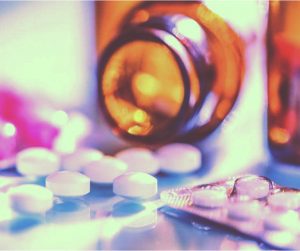Navigation:
- Oxycodone and the Brain: The Pain Relieving Effect
- Short-Term Side Effects
- Oxycodone Overdose
- Addiction Treatment
Oxycodone and the Brain: The Pain Relieving Effect
 Opioids and opiates are narcotics that are generally prescribed for pain relief—but not all of them are legal. Heroin, for example, is an illegal narcotic. Those that can be prescribed, such as oxycodone, are given to patients who are struggling with moderate to severe pain. Opioids are very potent, and that is why they are only given if the condition cannot be treated with simple over-the-counter pain medications. Narcotics work by blocking the pain signals from entering the brain. They change the way the brain responds to pain, therefore giving the user relief. However, they also trigger the brain’s reward system in the process by making you feel euphoric. This is why so many people abuse their prescription. People take large doses of opioids in order to get high, taking their prescription for recreational purposes instead of for pain relief. If you think someone is misusing their prescription, keep track of their intake. You may notice that they are running out of their medication before they are supposed to. There are even some cases wherein recreational users attempt “doctor shopping” in order to get multiple prescriptions from different doctors.
Opioids and opiates are narcotics that are generally prescribed for pain relief—but not all of them are legal. Heroin, for example, is an illegal narcotic. Those that can be prescribed, such as oxycodone, are given to patients who are struggling with moderate to severe pain. Opioids are very potent, and that is why they are only given if the condition cannot be treated with simple over-the-counter pain medications. Narcotics work by blocking the pain signals from entering the brain. They change the way the brain responds to pain, therefore giving the user relief. However, they also trigger the brain’s reward system in the process by making you feel euphoric. This is why so many people abuse their prescription. People take large doses of opioids in order to get high, taking their prescription for recreational purposes instead of for pain relief. If you think someone is misusing their prescription, keep track of their intake. You may notice that they are running out of their medication before they are supposed to. There are even some cases wherein recreational users attempt “doctor shopping” in order to get multiple prescriptions from different doctors.
Short-Term Side Effects
There are dangers to misusing these potent substances. In fact, a lot of opioids are potent enough to produce side effects even when taken in proper doses. It’s no surprise that abusing the drug increases the risk. When taken, the drug may reduce anxiety while causing extreme relaxation and euphoria. Common side effects include nausea, vomiting, loss of appetite, dry mouth, constipation, dizziness, stomach pain, drowsiness, weakness, headache, mood swings, and excessive sweating. Expect the side effects to get more severe as the dose increases. Other side effects may be more serious and will require immediate medical attention. Contact your doctor right away if you experience chest pain, irregular heart rate, rashes, itching, hives, lightheadedness and swelling of the face, throat, tongue, eyes, feet, etc.Oxycodone Overdose
Did you know that more than 15,000 people die each year due to opioid overdose? They now kill more than all the other drug classes combined. And that includes heroin and meth. What you should look out for is the fact that oxycodone can cause an overdose. Oxycodone overdose is deadly because like other opioids, it can slow down brain activity. The person may act more lethargic, and their breathing might suddenly stop. Their heart rate may also slow down or stop. Symptoms of overdose include irregular breathing patterns, extreme sleepiness, confusion, and depression. They may also display other symptoms like constricted pupils, intense gastrointestinal distress, hallucinations, delusions, unconsciousness, shaking, tremors, seizures, and very low blood pressure. [maxbutton id="3" ] Do not hesitate to seek medical assistance. Overdose can be avoided with preventative measures. Anyone can overdose on Oxycodone, even if they have a valid medical prescription. If your doctor gives you oxycodone for your pain, be sure to follow their instructions carefully. Most cases of overdose are closely connected to addiction. As a habit-forming substance, oxycodone can easily get someone hooked, especially if they are taking it frequently. First, they will develop tolerance, and they will start taking more opioids to get high. Soon they’ll become opioid dependent, and they won’t be able to quit without relapsing or going through withdrawal. Addiction is when the person compulsively takes oxycodone even if they are already experiencing the consequences.Addiction Treatment
Addiction treatment is necessary so that the addicted individual can get over their withdrawal symptoms and cravings properly. A comprehensive treatment program will go a long way. With a combination of medical detox and behavioral therapy, they can get back to living a sober life. Look for a drug rehab facility near you today!
What Does Oxycodone Do to You: The Effects, Uses, and Dangers of Prescription Opioids is available on Rehab Near Me
from
https://www.rehabnear.me/what-does-oxycodone-do-to-you/

No comments:
Post a Comment